
Donate to Innerviews
Since 1994, Innerviews has provided uncompromising, in-depth interviews with musicians across every genre imaginable. And it does that with no trackers, cookies, clickbait, or advertising.
Your donations are welcome to help continue its mission of highlighting incredible music and artists, without any commercial considerations.
Your contributions will be instantly transformed into stories and videos, and cover hosting and web management costs. Importantly, your dollars will help ensure Innerviews remains absolutely free to all visitors, independent of their ability to financially support it.
Please consider making a donation today by using the PayPal QR code below.

Steve Jansen
Provoking Thought
by Anil Prasad
Copyright © 2019 Anil Prasad.
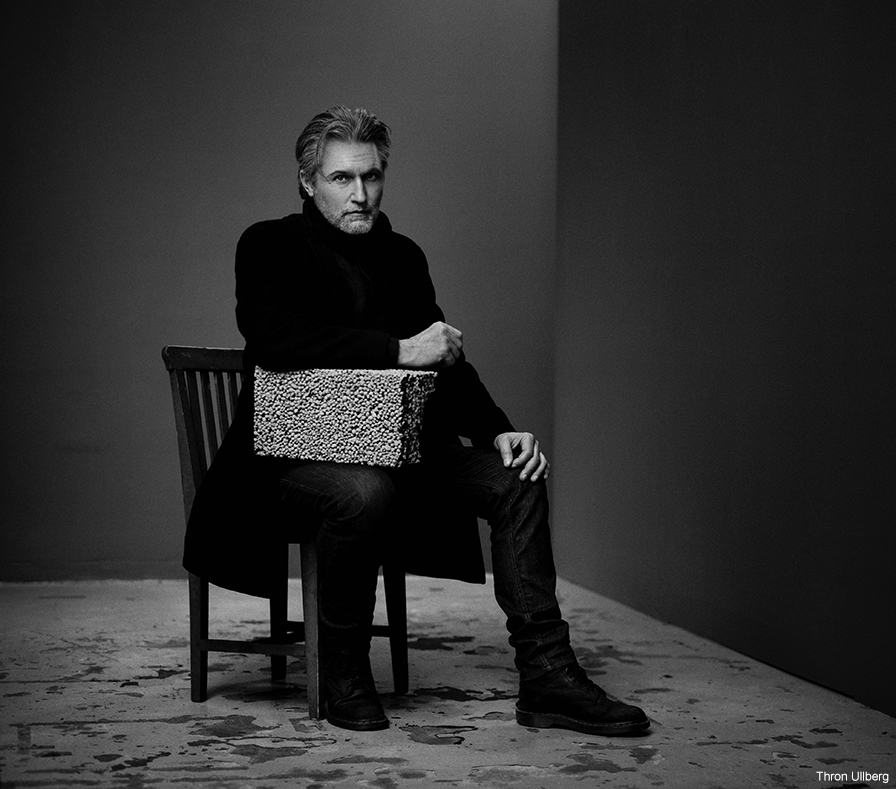
Steve Jansen’s career reflects a journey embracing diversity, tenacity and risk. The British composer, drummer, vocalist, producer, and sound designer has contributed his talents from the apex of global mainstream popularity to the edges of the experimental and avant worlds. He’s also a photographer with several exhibits to his credit in the UK, Japan, Canada, and Italy.
His latest project is Book of Romance and Dust, the debut album by his group Exit North. The recording focuses on nuanced songcraft and creative arrangements. Jansen, Charlie Storm and Thomas Feiner contribute in multi-instrumentalist capacities, and Ulf Jansson plays piano and keyboards. Feiner also provides vivid, rich vocals that accentuate the band’s spectral sound incorporating the ambient and orchestral, and the meditative and kinetic.
Jansen’s solo career began in 2007 with Slope which found him determined to break away from previous structures and expectations. The album is a hybrid of diverse instrumentals and eclectic songs. Those leanings also inform subsequent solo albums, including 2016’s Tender Extinction and its 2017 sister effort The Extinct Suite. Corridor, Jansen’s most recent solo work from 2018, is a long-form atmospheric installation piece originally designed to accompany a photography exhibition.
The eclectic rock act Japan is where Jansen’s career first achieved traction. He co-founded it with his brother, vocalist and multi-instrumentalist David Sylvian, with bassist Mick Karn and keyboardist Richard Barbieri subsequently joining. Initially formed with a glam rock bent in 1974, it evolved into one of the most revered bands of the early ‘80s. Its final studio albums, 1980’s Gentlemen Take Polaroids and 1981’s Tin Drum explored cutting edge synth and electronic percussion technology, as well as an ever-widening approach incorporating global music and minimalist influences. Archetypal band tensions led to its breakup in 1982 at the height of its popularity, but it re-formed using the name Rain Tree Crow in 1989. It recorded a single self-titled album released in 1991 that built on Japan’s foundations, with a more meditative, introspective approach than the quartet’s earlier work.
Rain Tree Crow dissolved after its recording came out. It was the last time all four group members collaborated, but it laid the groundwork for other related projects. In particular, Jansen Barbieri Karn, also known as JBK, emerged afterwards. Between 1993 and 2001, the trio released four instrumentally-focused albums that further expanded on the inclinations of Japan and Rain Tree Crow, together with collaborators such as David Torn, Theo Travis and Steven Wilson.
Jansen and Barbieri have also worked together extensively. In 1987, they formed a short-lived song-based project called The Dolphin Brothers that put out one album titled Catch the Fall. Jansen served as the band’s lead vocalist and percussionist. The duo has also released five mostly-instrumental recordings under their own names.
Between 2001-2007, Jansen teamed up with Sylvian again, first on Sylvian's 2001-2002 Everything and Nothing and 2003 Blemish tours, and then as one-third of Nine Horses, a trio also featuring composer and producer Burnt Friedman. It released a single album in 2005 titled Snow Borne Sorrow that revisited some of the areas explored on Rain Tree Crow, with the addition of jazz and electronica influences.
Jansen’s focus is now his solo output and Exit North, in addition to his photography. In 2016, he published his first book, Through a Quiet Window, featuring photos largely captured during his time in the group Japan in the 1980s. In addition to band pictures, Jansen specializes in cityscapes and processed natural imagery.
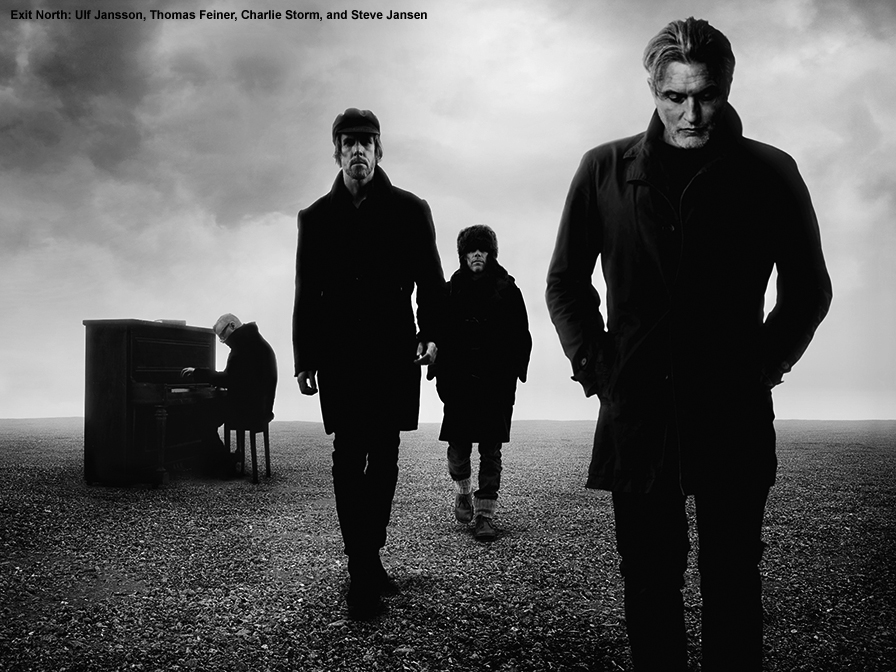
Describe how the Exit North collaboration came about.
I established a co-writing connection with Thomas Feiner in 2007 for my first solo album Slope. He co-wrote “Sow the Salt.” For my second album Tender Extinction, he co-wrote “Captured.” We felt we had similar motivations in music and in 2014, I proposed the idea of forming a more permanent partnership and making an album together. Thomas had been co-composing some sketches and ideas with Ulf Jansson, so this was the starting point for new material and we became a three-piece. Thomas had earlier forged a friendship with Charlie Storm, whom he first met at a show I was performing in Stockholm after Slope was released. Knowing that Charlie had a deep respect for the band Japan, Thomas asked if he would be interested in joining our group. At first, due to the enormity of this request, he was somewhat reticent about taking it on, but in the end he saw the sense in it. Charlie also knew Ulf, who had worked as a session pianist on some of the more high-profile acts he had produced. From start to completion, the album was a four-year journey.
Tell me about the musical vision you sought to achieve with Exit North.
We began by building upon the piano and rough vocal sketches that Ulf and Thomas had on the go, then broadened the scope to incorporate more material from each of us and worked on arrangements and lyrics. We each have a great focus on detail and a determination to avoid superfluous musical and lyrical content. We wanted to dig deep and express our connections with music and make the type of album we felt represented a culmination of our years of experience.
The group has no leader. We’re a democratic bunch and we discuss what we have and where we want it to go, always allowing for each person's perspective to be taken onboard. Thomas has an amazing voice. He is a natural vocalist and has a great talent for finding vocal melodies that are both unconventional and memorable. Ulf is a dedicated pianist. His contribution has been so fundamental to this project. His sketches have sparked so many directions and moods for the tracks. Charlie is a musician, but works mostly now producing some top Swedish artists in his own studio. Although he works professionally in the more mainstream area of music, his personal musical preferences are for more experimental and alternative ideas and he relishes the chance to use his recording skills to explore sonics and composition.
All three collaborators are Swedish. Is there a particular aesthetic at work that attracted you?
There is a patience and attention to detail with them that I find rare to come across these days. Most people want to rush the process and find the nuggets as quickly as possible. The time spent on this album has been well worth it. Admittedly, much of that time has been due to various individual work commitments, but even then it has been a constant pursuit for the best we can achieve without a concern for the time it takes. This type of music is timeless, so there's no bandwagon to rush towards. We want it to wholly represent our best over any test of time.
Describe the chemistry the four of you share.
We can communicate progress in composition and structure without being too precious about personal choices. We also have the confidence in one another to listen to, or suggest alternatives at any point during the work. The tracks have been through a number of changes and this process of raising the bar is only achieved by never resting on your laurels or believing your own way is the best way. We began with file sharing to initiate the project, but I've made numerous trips to Gothenburg so that we can all be in the studio together and work on ideas and performances in real time. It’s truly a collaborative band project in that sense. That’s why we credit the music as being co-written, despite the fact that obviously some tracks originated with one or two members.
Feiner and Jansson released a version of “Bested Bones” in 2012. Tell me why you wanted to revisit it and how it evolved.
Since this track was the spark for Thomas and Ulf as collaborators and since it was the starting point of Exit North’s material, this song shouldn’t be overlooked. We felt it related to the music we were making together. The earlier version was only released as a download, so it seemed like a good track to develop further as a band, which has worked out very well.
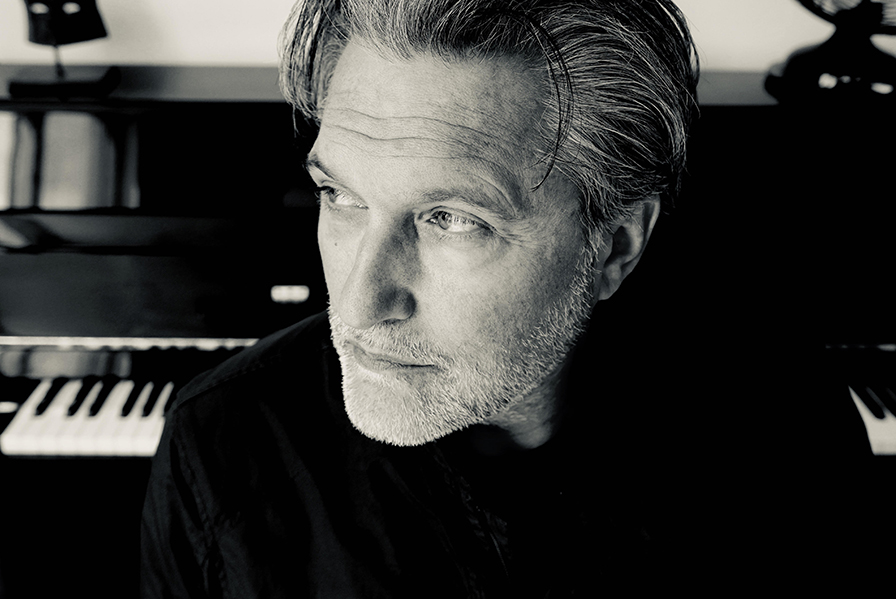
You’ve transcended the realm of rock musician into the world of bona fide composer. Describe how this gradual shift occurred.
Since laying my guitar to rest at the age of about 12 in order to focus on rhythm—as this seemed a much more exciting prospect—I had no desire to involve myself with chord structures or vocal melodies. However, I was very involved in the arrangement of Japan’s song structures and their dynamics. Things continued in this way between my brother and I for a number of years and went on into the next phase when Mick Karn, Richard Barbieri, and eventually Rob Dean, joined us. It was only a matter of time before I would have to work with all the elements involved in crafting song or instrumental compositions in order to progress musically and that became a natural desire for me once the band disbanded. Up until that point, there wasn’t much need to expand beyond the role of musician and co-arranger since the dynamic as it was—and that we’d all grown within—seemed to be working well.
Post-Japan, Richard and I began exploring co-composition, starting with songs. But we found our first recording opportunity was to create instrumental music, after which we resumed with our determination with making an album of songs. It didn't happen until Virgin Records decided to finance a project between Richard and myself—at great pain, it seemed. Virgin was struggling with a conflict of interests between ex-Japan members’ solo careers. Under the guise of The Dolphin Brothers, I learned to shift my focus fully from drumming or composing instrumentals to concentrating upon songwriting and being the lead singer. I wasn’t fully enthused with this prospect, but I saw it through. Despite Virgin pulling the rug from under us after the album was released, Richard and I continued to co-write.
I found myself being asked to continually contribute to other ex-Japan members' albums and tours which was somewhat ironic since they were the engineers of forcing the split of the band. I suppose that just demonstrates where the musical divides were at the time. My relationship with each was very amicable and I could tell how much they valued my input.
By early 1988, I was on the verge of exiting the UK music scene to join the Kodō drummers on Sado Island in Southern Japan. The idea of focusing purely on drumming with the challenge of reaching new goals both mentally and physically by exploring endurance and performance greatly appealed to me. I had been given written instruction that acceptance into the organization was possible. Meetings were in place and were it not for the fact that I was then called on to join David Sylvian’s In Praise of Shamans tour, which ran over a period of four months, my life would have gone down a very different path that year and perhaps onwards. One project then rolled into the next and the Kodō option was put aside. From that point onwards, composition had certainly become part of my remit in order to move forward as a musician.
Some of your work, including your last solo album Corridor, is designed for installations or gallery spaces. Describe the unique challenge of designing music for these environments.
A gallery is usually comprised of hard surfaces with few soft furnishings to absorb audio and without sound insulation to control it. Therefore, if you play music too loudly or with heavy bass frequencies, you'll end up creating sonic mud, as frequencies bounce around out of control. With Corridor, I wanted to create a fairly even piece that could be played at relatively low volume without disappearing into the general ambience and without being unsympathetic to the building’s acoustics. I wanted the music to catch the visitor’s ear and enhance the experience of being in the space and viewing the images without being overbearing or jarring.
Tell me what vibe you created Corridor to communicate.
The first half of the piece is designed to create a sense of stillness which gradually stirs into something more harmonically structured which drives the emotions more. Then, from approximately 30 minutes onwards, are pieces I had previously written as two parts in “STER_01” and “STER_02.” This acronym was on a folder containing audio I had accumulated and stands for “Sounds That Emit Randomly.” I thought they would work as part of the Corridor brief.
I also added a second track titled “Recovery Room,” which wasn’t part of the gallery audio, but was a track I had been working on over the course of the year. I thought it made a good juxtaposition to the more ambient music on the release.
Detail the creative process that drives your recent compositions.
This varies depending upon the type of music I’m working on. If I’m searching for a mood to trigger a direction, then I often start with fairly obscure sounds or rhythmic content that I process through various plugins in order to conjure up something unpredictable. This can then lead off in any number of directions and I’ll swing towards the one that inspires me to expand more upon it. If that doesn’t work out, I'll reevaluate things and try again. I often have to live with a new composition for a period of time to know that it’s something that represents me, because that’s not always clear when I’m in the throes of making it. Like standing too close to a large painting, you get lost in it. Once you take a few steps back—which for me in this case requires not listening to it for a number of weeks—then you learn more. On the other hand, if I’m working on music that's more standard, like Exit North, then it will be a more straightforward process of constructing arrangements that will lend themselves to vocals and song arrangements.
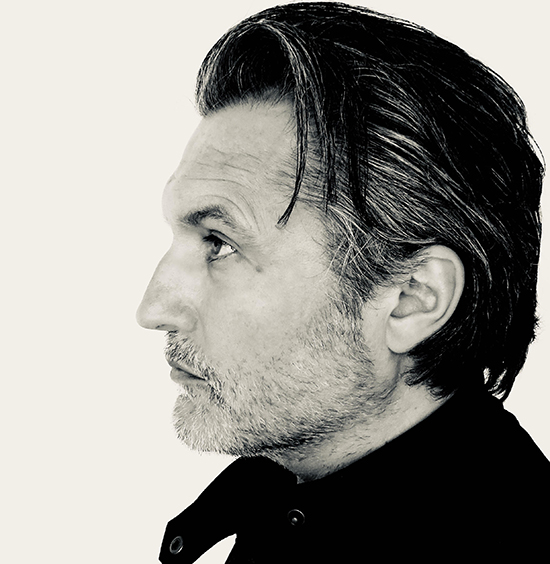
Tell me how you typically capture your work these days.
Working for record labels is so far removed from the creative process for me now, and probably also for many musicians globally. It’s important to attempt to strike a balance between the tools at your disposal and being creative. Technology is a double-edged sword in that there's so much great stuff out there that you could potentially become immersed in for weeks learning new programs or plugins, or how to get the best out of them, but not actually get around to making much music.
I try to keep focused on the fact that the technology is a means to an end, not the driving force. Often, music that’s created with a large emphasis on new technology tends to date pretty quickly. I’m sure there are many musicians out there who, like me, sometimes hear a piece of music and think to themselves “Oh, that artist obviously got that latest plugin that we all received emails about.” But we all have to explore these emerging technologies. They’re fun. Ultimately though, recordings made with great mics are the best to work with. Even if you transform them into something electronic and unrecognizable, the original source quality is paramount.
So, it’s good to have tools at your disposal and they can be great for bringing ideas to fruition, but it’s important to note that when recording real instruments, you’re also capturing harmonics in the room and in the body of the instrument, which are not easily reproduced in a sample. The air stirs when you capture performances and there’s an audible difference.
I used to have my own studio space in an outbuilding in my place in West London, but since lost that space and have had to make do with a combination of a writing, programming and editing room, and when necessary going into a proper studio space for acoustic recording.
Provide some insight into the instincts that drove the suite of songs comprising Tender Extinction.
I work from the emotional gut instincts that describe to me what it is to be a sentient being. I remove myself from any references to other people or popular culture. I explore sound and composition without any preconceptions about the finished piece or its place in the world. With Tender Extinction, I worked in this secluded way and then invited singers to find any inspiration from what they heard. Reaching that point of sharing the material is quite difficult, but when you get a positive reaction and another person’s input, it breathes a new life into the work which is so motivating and inspiring.
Explore your interest in using vocalists other than yourself in your music as Tender Extinction does.
I’m aware of my limitations and singing isn’t one of my strong points. I like to make albums that explore good performances or constructs that deviate a little from the norm. I don’t feel comfortable with my own vocals in that way and therefore, for the most part, I leave that to those who do it well. Perhaps to some degree, this comes from my formative years in a band where the vocals were left to someone else while I would get deeply immersed in the musical arrangements.
Does the realm of traditional songcraft still interest you?
When I listen to music, which is usually only while driving, it’s most likely to be something from the past that offers precisely that: good songcraft—like songs by Burt Bacharach, The Carpenters, Serge Gainsbourg, The Beatles, Joni Mitchell, Yé-yé, and Vashti Bunyan. These are just very random recent examples, but yes, traditional songcraft is something I really admire and take pleasure in listening to.
Describe the connection between Tender Extinction and The Extinct Suite.
The music of Tender Extinction started out as fully-instrumental tracks, some of which evolved into songs. After the album was complete, I considered remixes, as one often does with a new album, but felt there wasn’t much scope for that. However, there was scope for the music to be compiled into one long instrumental piece, not just remixed but reimagined. By adding some additional pieces and segues, I felt I was able to turn the album into a musical suite.
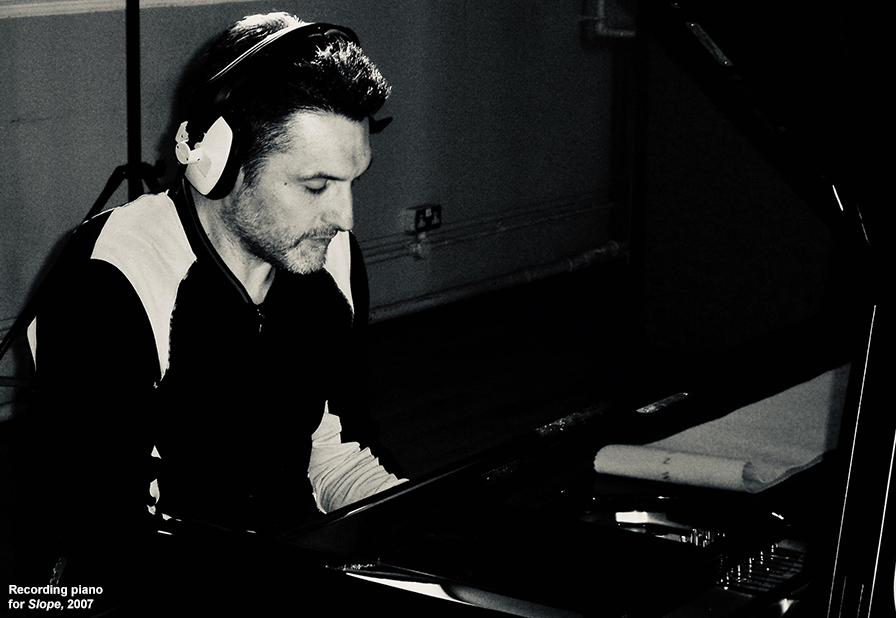
Reflect on stepping to the fore with your first solo album Slope in 2007.
I had been working with solo material in the background for a number of years while doing other projects, which explains why the tracks are all quite varied on Slope. It was my first solo release and therefore quite significant for me. I wanted to make sure that I was totally confident that the work represented me. My aim for the music was to combine my like for unusual rhythmic structures with orchestral arrangements, and where possible, quite ambient pieces and emotive songs. Not an easy mix. There are virtually no other musicians on Slope apart from myself and was therefore a gradual process of layering ideas, with a lot of editing. I wrote all the music myself.
Around the time Slope was taking shape, I was also working on the Nine Horses collaborative project. With the emergence of a new label called Samadhi Sound, which was initially something I was to be closely involved with, it seemed like the perfect vehicle for the release. The timing was such that it made sense to try to connect certain elements together and cross promote. When Slope was ready for release, I had already agreed to a tour to promote David Sylvian’s career, as well as the Samadhi Sound label in general. However, I was not permitted to sell copies of Slope at the shows, which seems strange when you consider Slope was on the very label being promoted along with its other releases. It wasn’t easy to understand or accept the reasoning for this and that was the first of a series of disappointments for me with the Samadhi Sound label. However, the album sold well and was very favorably reviewed which was a personal milestone for me.
Tell me about the collaborative process for your solo projects.
I’m not difficult to work with and I like to provide an environment that allows others to express themselves openly. If I can see things are not coming together intuitively, then I will try to respectfully coerce things into a direction more compatible with my own vision before moving on.
On my solo albums, I don’t tend to work with many other musicians—certainly not any well-known ones. I do work with vocalists though and I find this is a situation best served by allowing them to explore what they want to do in their own time and recording space. Fortunately, on most occasions this has worked out well. On one or two occasions it hasn’t, but that’s to be expected.
Explore the decision to approach Anja Garbarek for “Cancelled Pieces” from Slope and how that collaboration manifested itself.
I first started working with Anja on her album Smiling & Waving, and we went on to do a string of shows together to promote the album. Most of those were in Norway, but a few shows occurred in London and elsewhere in Europe. We became quite close as friends. Anja is very resolute when it comes to her music. She doesn’t always know how to find what she wants to hear, but she certainly knows what she doesn’t want to hear. I sent her the track “Cancelled Pieces,” believing that it was virtually impossible to come up with a vocal for it, but if anyone could, it would be Anja. She had it for a long time, I’d half-given up hope, when suddenly it came back to me with all the parts you hear in the final mix. Anja is so good at allowing the timbre of the music to suggest a lyric and attitude for a song. I think she did an amazing job on it.
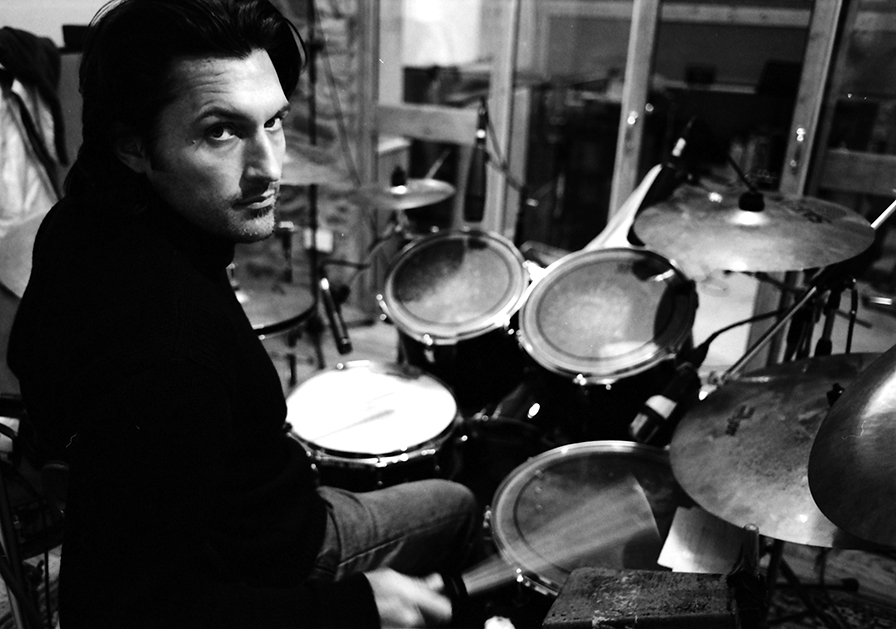
In previous musical lifetimes, you were predominantly known as a drummer. Describe how your perspective on rhythm has shifted over time.
I was a self-taught musician who jumped in the deep end and therefore didn’t have time to spend hours on learning paradiddles or drumming techniques through formal teaching. I was far too keen to be playing in a band to deal with all that nonsense. My method was to listen to other drummers and try to copy what I thought they were doing, then learn to adapt it to the songs we were making. These days, I rarely find the urge to add drums to music. This obviously has a lot to do with the type of music I tend to be making now. I guess I feel that rhythm is almost always present in contemporary music, often superfluously, to serve as a kind of glue, rather than really integrating with the rest of what’s going on. I think people tend to go with the thought that sticking a groove on a track, instrumental or otherwise, will make it sound more complete, but it’s often just covering up a lack of content. I attempted to incorporate drums on the Exit North album, just as I did on Rain Tree Crow, in a way that dances around the musical content, not simply running through blindly as a backbeat.
All of Japan’s members evolved into serious presences on their instruments and acclaimed avant composers. What was it about the path of Japan you feel opened up these possibilities?
I think it was obvious from the start that’s where we were coming from—once people looked beyond the image. As a group, we took great pleasure in focusing on our individual roles within the construction of the music and how parts interacted. Tin Drum is an obvious example of this. The instrumental parts are pieced together like a jigsaw puzzle.
There was a sense that much more is possible if you look beyond how things are traditionally done by pushing yourself to look for something different and avoiding musical clichés. This became a mindset that continued beyond the life of the band.
The general public isn’t usually aware of the creative forces at play in the studio and an entire project becomes filed under the front man, as is the case with Japan and, more incredulously, Nine Horses. I think people want to believe their “idol” is responsible for all that is good, but it’s a little daft from this side of the fence. During Japan’s latter years, I never personally made any effort to dissuade the media from the notion that our front man was responsible for the direction and success of the band. I didn’t even care what the perception was because I wasn’t riding on my ego, as was also the case with Richard. But there was some credit there for the taking for whoever was willing. But what's real to me is that the vast majority of Japan’s songs were not strong, which is why you’ll rarely hear a cover of a Japan song. The strength of the band was in the sum of its parts and that was down to the musicianship and arrangements that the songs were woven into, and which was not down to any one individual. I think that would be undeniable by any member of the band, however this was never the perception put out to the public, nor the publishers.

Reflect on your friendship with Mick Karn.
When Mick and I were together, it actually wasn’t easy to get any work done because we would enjoy one another’s company too much and would rather do anything other than be serious musicians. However, once we got stuck in the process of making music, we would spend many hours working things out. I think the last really concentrated time we worked together was on the JBK album _ism in the late ‘90s.
I felt immensely sad about Mick departing. I think it’s fair to say we were the closest of friends as we’d been through so much together, not just in work, but in our personal lives. Throughout the ‘80s and well into the ‘90s, we lived just a stone’s throw from one another in Notting Hill just off the Portobello Road and therefore much of our social time was spent together. We even managed to holiday together a few times.
By the early 2000s, I was spending more time in the US working on new projects and Mick had got married and become a dad—something I knew he wanted since he was such a great “uncle” to my son who was born a few years earlier. The Karns decided to uproot and move to Cyprus for a better life than the one they had living near Herne Hill on the South Circular. I think it was probably the right choice for them at the time, but it meant we saw very little of one another for the following decade or so.
What I miss most is the sheer ease of being in the company of this person with whom I could share so much. Not much would go unsaid, so there wasn’t any buildup of animosity or irritation. I have so many memories, right from those early Japan tours when our manager deemed it necessary for us to have to share rooms, even when visiting Japan, despite selling out massive venues over there. We didn’t seem to question things like that in those days. I guess it was simply more money into the coffers of management, who of course had their own rooms. So, Mick and I would share rooms, but we did manage to have a great laugh despite the inconvenience.
Of course, we’ve also shared many great experiences during the various recording projects over the years, with Rain Tree Crow being a particularly fine memory. And when you add to that all the socializing in between, it’s fair to say that we meant a great deal to one another. Mick generally made friends easily because he was a warm and jovial character. However, he would also leave them behind without any explanation if he felt the need to do so. But he and I were so closely bonded that our friendship could easily stand the test of time, even during his depressions and what might today be considered bipolar tendencies.
His illness came as a shock and I made it my mission to get him over to the UK as that was what he wanted, despite as it turned out, treatment no longer being an option. He bravely faced his remaining months with as much strength and dignity as anyone could. I did what I could to help get Dalis Car’s InGladAloneness, his final recording project, off the ground until the time came when his mind could no longer keep him focused. He had to ask if I would complete it for him.
A day or so after his death in January 2011, his body was prepared for the final farewell for close family and friends in a barren, semi-dark room just off the Fulham Road. Being the last person out of the door, I turned again to say a final goodbye just between us. I remember the door handle in my hand as I was pulling it closed and the confusion in my mind of having absurd, typical parting words spinning around in my head such as “see you later” or “look after yourself,” but this moment was of course so final, with no words being adequate. Pulling that door closed was deeply painful. I believe the impact hit me some months later when I suffered with some anxieties. I think my processing mechanisms for this were not that great.
Describe the creative trajectory JBK represented after Japan and Rain Tree Crow dissolved.
With JBK, we saw how the advances in technology meant that recording and releasing material needn’t necessarily involve bankrolling by big labels and gradually developed the idea of making our own label. It was a humble venture allowing us to enjoy the creative freedom we needed. We teamed up with the Polydor label in Japan for the JBK album _ism, which meant we had the best of both worlds with some label funding, but full artistic control and releasing it on our own label outside of Japan. I don’t think we had so many options to find outlets for music at this time, so it served us well.
The JBK album _ism reflected a very different recording environment from Rain Tree Crow, although we did some of the initial recording, including drums, in a residential studio in Wales in the heart of winter, where we ending up being snowbound for a few days. The remainder was done at Mick’s home, which wasn’t really set up for recording, but we made do. It was hard work. I was doing the job of engineering—somewhat out of my depth at that time—and I think that role stemmed from the fact that I was doing all of the programming, which then bled into arranging and making production decisions. This especially held true when working with so much sampled material, from rhythms, to bass, to synths, to audio loops. On top of that, I was taking on vocals and lyrics, so it was quite an intensive workload. I was glad to hand it over to a mixing engineer at the end and I think he salvaged quite a bit of it.
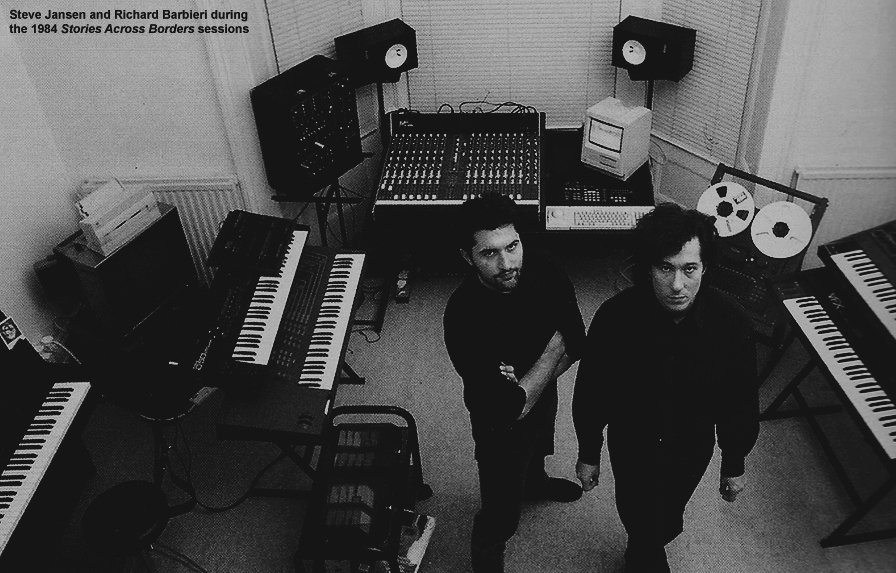
You’ve created several duo projects with Richard Barbieri, including The Dolphin Brothers’ Catch the Fall. How do you look back on the work you’ve done together?
Catch the Fall was born out of a desire by Richard and I to write song material. The vision was to make it a combination of relatively-accessible songs, but with our particular musical sensibilities. We selected musicians we had a certain level of confidence in due to either past connections or having an appreciation for their own recordings. Unlike the other ex-Japan members, we would not invite contributions from Mick and David.
The album has some nice arrangements and good contributions from other players. A couple of songs, such as the title track and “My Winter,” I think are the standout pieces that demonstrate our more innate musical sensibilities. Actually, I could more easily listen to Dolphin Brothers now than I could the next few Jansen Barbieri albums, such as Stories Across Borders and Stone to Flesh, as I hear too many failings in production and direction with these. At least the Dolphin Brothers had a clear agenda and was well-recorded.
Richard and I have enjoyed a good collaborative partnership over the years. He has allowed me to sit in the driver’s seat, so to speak, as he was most comfortable focusing on keyboards more than production or other instrumentation. We’ve not worked together for a number of years and I’m sure his approach to recording has progressed. I feel that Richard and I haven’t hit our potential as collaborators. We've discussed working on something together at some point in the future if the planets align again.
Where did the name Dolphin Brothers come from?
It was a suggestion from someone at Virgin. Coincidentally, it came at a time when I was a member of the Whale and Dolphin Conservation Society. I would go on the odd trip to swim with dolphins in the freezing waters off the British coast. So, I thought, why not?
What are your thoughts on the Nine Horses project in retrospect?
The Burnt Friedman connection set things off on a tangent and it was then a case of bringing the material more in line with what I would like to do. I was virtually living in the States during this period, so a lot of time was put into it and having Keith Lowe with us for some of that time helped move things forward. When I returned to the UK, the work carried on for quite a while by exchanging files virtually before more recording commenced in London studios. I like the majority of the outcome and believe it shows a real collaborative effort, musically. There was a great level of trust and free rein—something that can be problematic, but having those shared beginnings as teenagers made the collaboration uniquely compatible.
Snow Borne Sorrow took a long time to complete and was later followed by lengthy rehearsals for a tour to promote David’s solo career, again. The option not to tour as an unknown Nine Horses was a business decision made for the certainty of filling venues, which of course I understand, but was somewhat weak-willed about. I realized then that Nine Horses was inevitably being run into a dead end. Having already completed two of David’s previous solo tours between 2001-2004, to embark upon another in 2007 after having just spent a few years on a truly collaborative album, I knew I wasn’t doing myself any favours continuing in the same vein. From then on, I focused on a solo career and distanced myself from the Samadhi Sound label, which unfortunately went into meltdown. I'm glad we got to make that album, as well as an EP, when we did. No regrets there.
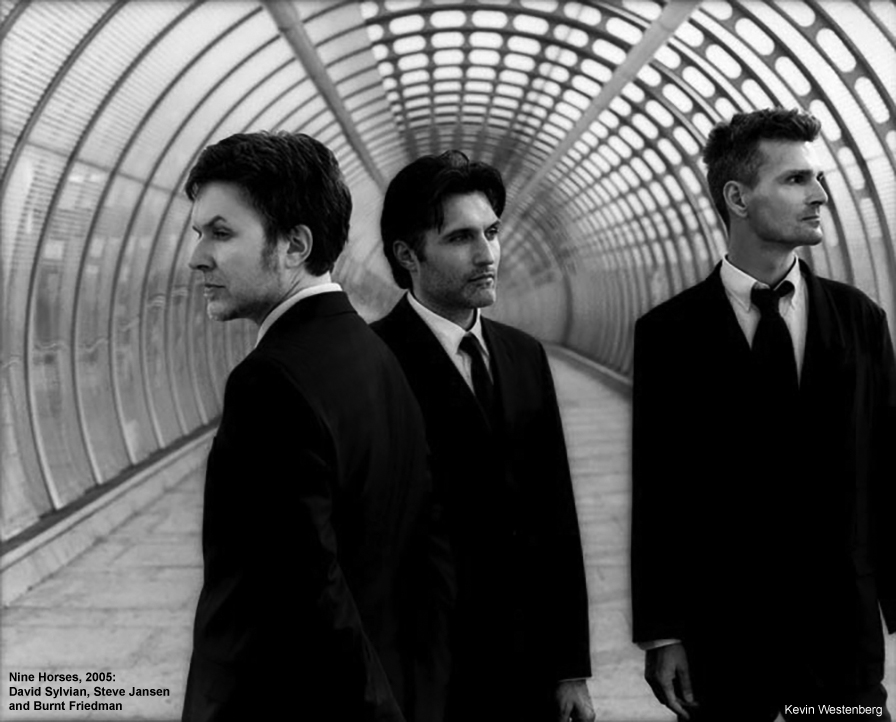
Brothers of more famous siblings, particularly within the same art form, often feel a burden of perception and expectation they wish they could escape. What has been your experience?
Of course it gets tiring being linked to other people’s names. It doesn’t matter who it is. It’s tedious when the usual suspects show up all the time as perceived parallels in order to convey an impression of what's being heard, probably because established references are less challenging than descriptive words. I'm partially responsible for those references existing in my brother’s case, having helped to define his solo material through my invited participation in those recordings and live performances.
I’ve always preferred to work relatively quietly and out of the spotlight. Ironically, so does David now, but it took him a while to calm down after having put a lot of energy into being a front man. His efforts were rewarded with the level of attention that role craves. Personally, I’m good with having focused on being a musician with no calling for the spotlight. When I did flirt with that role in the guise of The Dolphin Brothers, it was a real conflict for me because I loathed the attention it demands. The only reason I saw it through is because I couldn’t imagine working with another vocalist at that time because of the years I had spent working with David. Not too dissimilar to David not wanting to work with any other drummer on his solo material. Seeing myself fronting The Dolphin Brothers probably makes me cringe in the same way David does seeing Japan. By the time we hit the ‘90s, it was still normal to think the past was all in the past, but then they invented the Internet. I believe the healthiest thing is to take it on the chin rather than getting upset about how it doesn’t represent who you are now.
We all have a love for the music we grew up with. I do too, but the music I made with Japan is not the music I grew up with. It was a creative output and I just see it for all its faults. But I fully respect that for other people it's the music of their youth and it means a lot to them, and that it remains the main focus for those people no matter what else I put out there. But that also means almost without fail, any music I put out which contains a male vocal will be referred back to that soundtrack of their youth. And similarly with the press, they will do the same but for different reasons. Those comments don’t register with me. It’s like having a nagging pain in your neck that you eventually learn to ignore.
In the introduction to your Through a Quiet Window exhibit, you wrote that a core motivation for your photography work was that “life was showing and teaching me things so fast that I knew no matter what I did, I would miss much of it.” How does photography capture and reflect life’s teachings back to you?
Photography is another recording medium. I found it necessary at a certain active time in my youth to introduce photography into my world of documenting. The photos now serve as reminders and memories of course, but life’s teachings are ongoing.
I like the way in which photography draws you in—probably not too dissimilar to music in a way. I think we’re more visually drawn than aurally. We certainly rely on our sight more than our hearing to understand our world. But it’s also to do with creating an alternative view of what the eye can see. When you consider it, to be able to pause a visual moment in time is something quite miraculous, but of course we take it very much for granted now. I enjoy the fact that this paused moment can give rise to emotions that would never have been perceivable at the time. I also think as more time passes from when a picture was taken, the more significance it gathers, as if storing up an energy that started to grow the moment the image was taken.
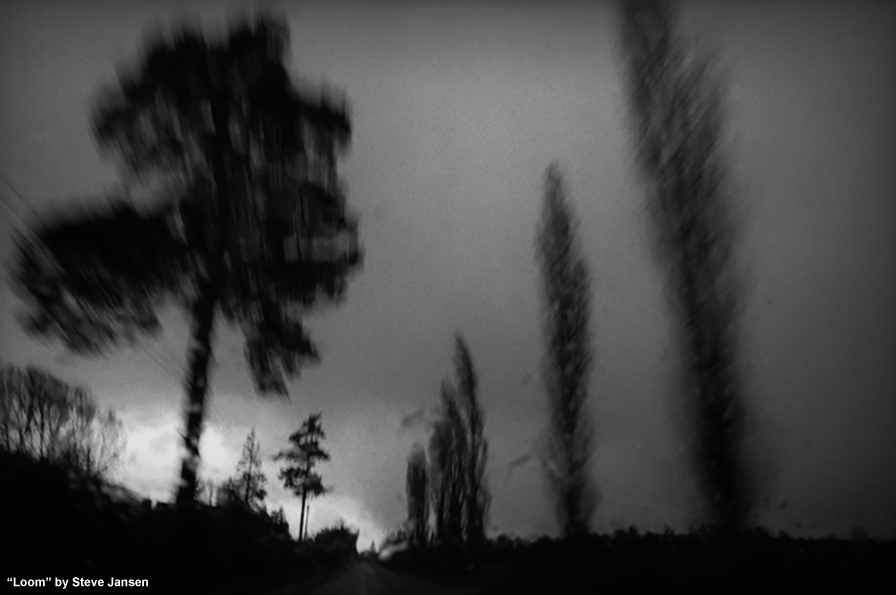
How does the visual affect the musical for you and vice-versa?
Generally speaking, I don’t think visuals help music. We take much more information from visual components and this can so easily mask the subtleties and significance in music. Reverse that and I think music can enhance a visual experience well and can help convey an emotion that’s not apparent in the visual—although I’ve always felt that the best films work with silence rather than soundtracks.
You’ve said you’re a devout minimalist. What does that phrase mean to you and how does that description inform both your musical and photographic output?
I’m not good having clutter around. It confuses my thought process and makes me uncomfortable. I’ve done away with shelves or displays other than what may live on a piece of furniture that aesthetically works. Everything else is put away—something you can finally indulge once your child has grown and flown. During my formative years as a drummer, I developed a certain type of OCD—a restless, nervous energy, forever tapping or shifting about or becoming obsessed with doing things the “right” way. Relaxing wasn’t really part of my remit. For me, now that sense of calm comes from orderly surroundings, uncluttered minimalist space, and cleanliness. I enjoy the aesthetics of minimalism and how it provides a clarity of mind, and that appreciation arms you with a good eye for how a scene is “framed” because it’s about objects making a statement by their placement in a space.
The world is in a dark state on multiple fronts. What role does art have to play in helping elevate it out of the morass?
Humanity is a bit dark and desperate, not the world. For me, any sense of spirituality comes from what life is. I see no benefit from gods and heavenly afterlives. We have all not existed, yet it seems inconceivable once we become sentient beings to think of not existing again, and that fear causes us to believe in some bizarre theories. As an anti-theist, I place more emphasis upon the significance of life, which in turn makes me appreciate and be respectful towards the lives of others. I feel that’s all it takes for things to improve in this world, should we want it to.
Religions remove us from that basic care and respect for one another and instead shifts the focus onto gods who then coerce us to a better understanding according to religious texts contrived by other men for their own purposes. Why is that allowed to exist and even be passed on through schools? To me, religion is primarily about the manipulation of people en masse, enabling powers to maintain control, and to suppress and prevent people from thinking for themselves. We already know how religion is responsible for death and abuse on an absurd scale and yet this is supposed to be a good thing? If people find comfort in grouping together under the banner of a particular concept or faith, then it should be an indulgence without any power to wield over any other aspect of society.
The function of art continues to provide a stimulus for humans to challenge and provoke thought and tap into that side of ourselves that seeks perspective or insight.